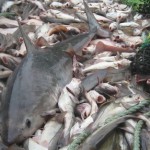 JEDDAH (SAUDI ARABIA)- The numbers of sharks in the Red Sea are rapidly declining. There is too little information on them because of lack of research. Researcher Julia Spät, of the Red Sea Research Centre of the King Abdullah University in Jeddah, conducts a research project about the status of sharks in the Red Sea.
JEDDAH (SAUDI ARABIA)- The numbers of sharks in the Red Sea are rapidly declining. There is too little information on them because of lack of research. Researcher Julia Spät, of the Red Sea Research Centre of the King Abdullah University in Jeddah, conducts a research project about the status of sharks in the Red Sea.
Spät found surprisingly low numbers of sharks in the water. She used BRUVs (Baited remote underwater video surveys were developed in Australia, and are now used around the world for a variety of projects. By attracting fish into the field of view of a remotely-controlled camera, the technique records diversity, abundance and behaviour of species), long-line sampling, and market survey data with information from ongoing shark tagging and genetic studies. B
BRUVS in Saudi Arabian inshore and offshore reefs, in conjunction with long-line surveys, revealed a dramatic lack of reef-associated sharks. Catch per unit effort for Saudi Arabian Red Sea BRUVS ranges between 10 – 60 times lower than data available for the Atlantic, Pacific and Indian Ocean. Despite this, relatively large quantities of reef-associated and pelagic sharks could be found in the fish markets in the region, suggesting heavy fishing pressure on existing populations.
The collected data will help the establishment of a baseline on the current status of Red Sea shark populations, serving as a foundation for future studies on these historically overlooked stocks. This research is ongoing.
Read more at the Dutch Shark Society. Or see the video below on how the BRUVs work.
